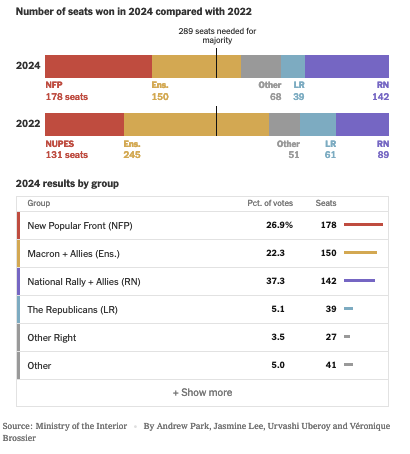Macron copies US Democrats
Breitbart reported the French election results confirmed the “alliance of dishonour” between President Emmanuel Macron and the far left effectively blocked the populist National Rally from gaining a majority despite the Le Pen party claiming the most votes. The New York Times reported a coalition of left-wing parties that is now the dominant force. The results as follows:
The Wall Street Journal reported Deeply Divided France Risks Unprecedented Deadlock After Election Shock. Polarization has for years left the country’s politics stuck in an unpopular middle ground, and the latest elections won’t change that. Macron Loses as the Left Rises in France. He defeated Marine Le Pen’s party, but at the cost of empowering some unsavory bedfellows.
This "alliance of dishonour" sets up a continuing stalemate in France. One the globalists around the world have celebrated with glee; Brazilian President Luiz Inacio Lula da Silva announcing on 'X' that French politicians had united against “extremism” and Columbia Journalism Review saying, ...France’s ‘political miracle’.
Using the 'extremism' political narrative in the US, this all seems to parallel the left-wing Democrat Party in the US, confirming the unified, worldwide, globalist forces. Democrats have made alliance with far-left radicals, green party radicals & socialists to form a voting bloc that puts them at odds with the rest of the country.
In the US, the Democrats have joined this globalist cabal on purpose. In France, it was a desperate strategy to hold off the largest vote getter, Marine Le Pen's National Rally Party. It would appear from the results if she had done as Macron and consolidated with the 4th place right wing group, they could have declared victory with the most votes and the most seats.
But, even then, the splintered voting blocs would still not provide a unified government.
France has a problem. The multiple party ballot offers too many choices for them to ever get a unified government. Yet, the socialists hold on to power in another important country.
There was stunned silence at the far-right National Rally (RN) party headquarters as the results of France’s legislative elections came in.
Sadly, riots have erupted in France tonight after the shocking election results.




